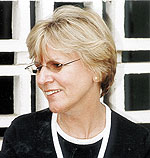
Anne Delorie is the finance director. "I came to Kenya in 1970 with the peace-corps. Now I’m in partnership with a few other people – running a curative and evaluative medical service called Mediplan Ltd."
Four good shepherds
By Judy munyinyi
Pics by Abraham ali and reach
When the cry of the poor reaches their ear, these women don’t turn a blind eye; they reach into the situation and turn it around.
One of the incubators donated to Pumwani hospital
The old African way of life depended a lot on sharing. We were taught from an early age that sharing is an honourable thing. But not all sharing is beneficial. At the Pumwani maternity hospital, two tiny babies share an incubator. One nearly loses its life as a result. Totally oblivious to the gravity of her actions, baby number one – in the normal flexing action that is common to babies, slowly pulls out a tube that is keeping baby number two alive.
Had the directors of REACH not been in the ward and alerted the nurses, the baby would have surely died.
REACH stands for Resource Exchange In the Advancement of Community Health. It is a non-profit, non-governmental organisation founded and run by four women, all directors. They’re also the general dogsbodies of the organisation – drivers, secretaries, travel agency, tea-girls and fillers of any other role that may arise. They were at the Pumwani hospital to do a follow-up visit on the installation and distribution of medical equipment that they helped donate to the city council-run hospital. For their donation, for their time and for their effort, they have been chosen our Heroes for the month of October.
You may wonder why an organisation has been nominated as a hero. Well, for starters, we are focusing on the women behind the organisation, not on the organisation per se. Second – this organisation actually fits our criteria to a tee. There are no men in it (they say the ‘Y’ chromosome is not allowed – it just "wastes time"), all the women have day jobs and do the charity work on the side, and they are directly giving back to community at their own expense.
REACH Directors with the IMEC assessor (centre).
The group of four comprises Dr Fatma Abdullah, Anne Delorie, Elizabeth Kegode and Mary Matu.
Personal Profiles
Dr Fatma Abdullah, M.D, is 42 and married with two children. A lecturer at the University of Nairobi’s faculty of medicine, this bubbly don teaches haematology and oncology. Dr Abdullah is the medical director of the group.
Anne Delorie is the finance director. Married as well and with two children, she gives her age just as "over 40." "I came to Kenya in 1970 with the peace-corps then worked with Doctors Silverstein, Warshaw, S. K Shah and Prof Mugambi. They’re all in cardiology. Now I’m in partnership with a few other people – running a curative and evaluative medical service called Mediplan Ltd. It is in Upperhill."
Elizabeth Kegode — Director of programmes.
Elizabeth Anne Kegode, the group’s director of programmes, is 35. This lovely, quiet lady is the wife of Tony Kegode, the airline "mogul" who has recently been in the media over some legal tussles. A mother of two, Elizabeth is the only one who calls this her day job.
Mary Matu is 43 and married with two high school boys. She holds the title of chairman of the NGO. "I run a medical equipping business and I am also a health management consultant," she says. Mary has a degree in hospital administration and a Masters in public health policy and administration, both from the USA.
No pay
Despite what sounds like high paying jobs in a posh NGO, their jobs don’t pay anything at all. As a matter of fact these directors of REACH regularly reach into their own pockets and give their money and time to make sure that women less fortunate than themselves and their children have a better chance at life.
Dr Fatma Abdullah — Medical Director.
Together, they have recently spent at least Sh1.5 million of their own money – that’s about Sh375,000 each – to ship to Kenya a container packed choc-a-block with reconditioned medical equipment from the USA. But they don’t tap their backs about this; their main interest is to see an improvement in the health and well being of women and children, something they are determined to do no matter the cost.
"Bringing in that container must have cost about 1.5 million. That included the cost of flying in an assessor from the USA to check what Pumwani needed, getting the container from the USA, paying all the taxes, transporting it from Mombasa and handing it over and finally, flying the assessor back in after the installation was done, to ensure that everything had been done according to plan," they explain.
A good kind of sharing
Fatma is astounded when I ask why they give to the community.
"How can I not?" she questions back. "How can you not give back to society?"
Anne Delorie — Finance Director.
"I think upbringing helps. In Islam we are taught that whatever you earn is not just for you. You have to put something aside for others, only then will we get somewhere as a community." In her opinion, donor funding comes with strings attached. "But when I give, there is nothing attached," she explains, adding that she believes that even if what an individual gives is small, it will make an impact because, "haba na haba hujaza kibaba".
"Maybe my religion also helps. Part of your wealth belongs to the poor so you must share it. By doing that, you are investing – the Koran says that you will get back 700 fold."
••••
For Anne Delorie, it’s very simple. "Why charity work? Kenya’s been very good to me and it’s payback time."
••••
Elizabeth Kegode says that her charity work costs "mostly time but also a little money and energy." "In return, I get a lot of satisfaction. Seeing that I’ve made an impact – like seeing one baby in an incubator instead of four – that gives me satisfaction."
••••
Mary Matu — Chairperson.
Mary Matu says, "I grew up in rural Kenya and by God’s grace, I have been assisted a lot by other people. I have received scholarships from both the National Council of Churches of Kenya and the Aga Khan Foundation. This is my way of giving back to society."
Very modestly the directors of REACH say their contribution is minimal. "What IMEC (International Medical Equipments Collaboration) has done is substantially more. They collected, reconditioned, packed and shipped the equipment in the container, which was valued at, at least, half a million dollars."
That’s over Sh40 million.
They’re a volunteer organisation based in Massachusetts in the USA and made up of mainly retired physicians. REACH heard about IMEC through Elizabeth’s father, himself a former physician. These physicians are responsible for the pre and the post installation inspections, determining what the hospital needs and then flying in later to confirm that it has been done according to plan.
They explain how it works.
"Hospitals in the USA are required to upgrade their equipment every three years or so. So they donate what they have uninstalled to organisations like IMEC."
IMEC reconditions and packs everything that it receives. It could be anything, from stitching a torn bed-sheet, oiling a creaky hinge on a stretcher or giving a fresh coat of paint to that nearly new baby warmer, and then they send it to organisations like REACH.
"We’re what is called a shepherding agency. We do the clearing and forwarding and ensure that the container gets to its destination," Elizabeth explains.
In the beginning
REACH was founded as a result of a donation from doctors in the USA to create HIV awareness in Meru. The money was to go through Mary Matu. "I registered REACH because there was a need for legality and to allow for the handling of money. I also needed a functional board and so the positions were filled by us." "Permanently!" someone quips and they all burst out laughing. These women laugh a lot.
"We complement each other on our strengths and we have good connections. We’re very good friends actually – we have three hour board meetings every Wednesday morning – 20 minutes discussing work, and the rest just catching up!"
Mary takes over. "The health of women and children is our key area of focus. We resource only poor community institutions; this means that we will not work with hospitals like Nairobi or Aga Khan as they are already on their feet."
"When we first came to the Pumwani hospital, there were up to five babies in one incubator. And there were only two functioning incubators at that!"
Thanks to REACH and IMEC, things are now a little better for mother and baby at the Pumwani hospital. The container that they brought in had incubators, baby warmers, anaesthetic machines, beds, stretchers, wheelchairs, lots of linen, surgical equipment, obstetrical instruments, baby cots, medical books, reference materials and even dustbins! The theatre is also now fully equipped.
Elizabeth, probably the more diplomatic of the ladies, points out that Pumwani is a place with a lot of needs. "As we speak, there are 270 new babies inside there. Really we must acknowledge that the staff here work under difficult conditions and they’re rarely acknowledged to be doing good, even though they are excellent workers.
"We had to assess the needs and see what could be done. We needed to enable the women who come to give birth here to have their dignity and the (ability) to give birth in a safe environment."
"We can’t abandon Pumwani. People are still coming here. They have no choice. And it is the biggest women’s hospital in East and Central Africa." "North of the Limpopo and south of the Nile," someone tries to clarify. "Between Cairo and Johannesburg" another says.
Alright, already we get the drift.
Mary, who supplies medical equipment, says she knows how expensive it is, "and I know that Pumwani just does not have the money to buy the needed medical equipment."
The container was a response to then Local Government Minister Karisa Maitha’s call for people to help the hospital out.
"Getting in the container was not easy but at the end of the day, we did it. City Hall was a big thorn in the side; there was no personal gain for them so they were not very cooperative, otherwise why should you fight someone who’s going to give you 40 million shillings?
"There is inconsistency within Government. You get some great people who are wonderful and helpful and grateful, and then you have others who are not. But nothing’s impossible. We didn’t pay a single cent to get anything done. From start to finish it took about eight months to get the container here.
"On a local level, we’ve managed to do fundraising for smaller items. Like there’s a time we gave away baby blankets to all the new-borns here. We have also launched the integration of HIV/Aids into the school curriculum in Meru. Now we’re looking to the issue of education for girls and empowering Aids widows and orphans."
The directors even got an IMEC commendation and it wants them to pick up another programme.
"In the arid and semi-arid areas of Kenya, there is very poor/non-existent health infrastructure. Pumwani is actually a lot better than many provincial hospitals. There is now something that we’re hoping to implement there but we don’t want to talk about it yet — the time is not right."
The group is also currently working on bringing in another container.
Shepherding equipment, paying for its transportation, identifying a needy cause and doing something to alleviate the suffering of others. If that’s not heroic, what is?





